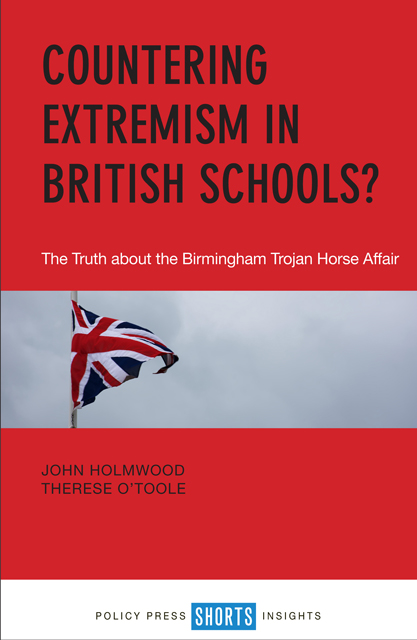nine - The NCTL hearings and their collapse
Published online by Cambridge University Press: 21 April 2023
Summary
In a short space of time – from early March to June 2014 – a particular narrative of the Trojan Horse affair became firmly established. This was that a small group of individuals, associated with PVET and operating with a hardline and conservative religious agenda, had taken over control of a number of local community (that is non-faith) schools in East Birmingham and had sought to establish an Islamic curriculum. In doing so, head teachers and other teaching staff had either been bullied into line or had been forced out. This narrative was given particular emphasis by the Clarke Report, which proposed that this conservative religious agenda was also extremist (as defined under Prevent) involving active hostility to ‘British values’.
The nature of the evidence put forward was largely statements by witnesses involved in changes in local schools in the context of the government’s academies programme. There was little opportunity for those at the centre of the charges to provide their own account. Although Ofsted inspections allow some involvement by a school, there is no formal opportunity to engage with a draft report and have inspectors reflect upon and modify their judgement (though we have seen suggestions that the 2014 Ofsted report on Park View Academy was modified at the instigation of Ofsted or the DfE). Inspections are simply a description of what is said to be found at the time of the visit. Nor is there an obligation upon the inspectors to reflect on those findings in the light of previous reports. Equally, the Clarke and Kershaw Reports took witness statements from many individuals, but did not seek to test whether the events described had, in fact, taken place, or were as described to them. Indeed, the Clarke Report provides a list of 20 serious incidents at PVET, about which it comments, somewhat laconically, ‘it is only fair to point out that the Trust disputed most, if not all, of the allegations’. This comment is itself misleading, since, as we shall see, exculpatory evidence was provided not only by the Trust, but also by an official at the DfE responsible for the academies programme and by the religious education adviser at Birmingham SACRE, but those views are not presented in the Clarke Report.
- Type
- Chapter
- Information
- Countering Extremism in British Schools?The Truth about the Birmingham Trojan Horse Affair, pp. 195 - 226Publisher: Bristol University PressPrint publication year: 2017



